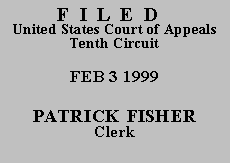

| HELEN DIANE McCARTHY, |
|
| v. | |
| MICHAEL HEATH JOHNSON,
Defendant - Appellant,
and |
|
| KEITH BROWN; ROLLING STONE (PTY) LTD.; ROLLING STONE (S.A.), |
The dispositive issue in this case is whether, under Utah law, a judgment can be renewed by way of a motion and notice filed in the original case, or whether it is necessary to file and serve a new complaint. The district court held that a motion and notice in the original case will suffice to renew a judgment. We agree, and affirm.
In December 1988, Helen Diane McCarthy sued Michael Heath Johnson in federal district court in Utah, alleging that Johnson had defrauded her out of more than $6 million. Soon thereafter, Johnson answered McCarthy's Complaint. In August 1990, however, apparently as penalty for various discovery violations, the district court struck Johnson's Answer and entered default judgment against Johnson in the amount of $6,243,738. Johnson has not paid the judgment.
In June 1997, McCarthy filed a motion to renew the judgment, pursuant to Federal Rule of Civil Procedure 69(a). Johnson opposed the motion, arguing that Rule 69(a) does not provide a basis to renew judgments, and that even if it did, Utah law requires a litigant wishing to renew a judgment to file and serve a new complaint and summons. In December 1997, the district court issued a memorandum and order rejecting Johnson's arguments and holding that McCarthy could, under federal procedural rules and state substantive law, renew a judgment by filing a motion in the original case and serving notice of that motion to the opposing party.
Johnson appeals, pursuing the same arguments he raised in the district court.
Johnson first asserts that Rule 69(a) does not provide a basis for the renewal of judgments. This formalistic argument does not help him. Regardless of whether renewal of a judgment may be sought through Rule 69 or through some other method, it cannot be seriously disputed that the renewal of a judgment is relief that may be appropriately sought in the district court. Some federal courts have allowed litigants to seek such relief through a Rule 69(a) motion. See United States v. Fiorella, 869 F.2d 1425 (11th Cir. 1989); Urban Resorts Group v. Wheeler, No. 82-2470, 1996 WL 28507 (E.D. La. Jan. 22, 1996). Authority also exists for allowing such motions under Fed. R. Civ. P. 81(b), which provides that "[r]elief heretofore available by mandamus or scire facias may be obtained by appropriate action or by appropriate motion under the practice prescribed by these rules." See 12 Charles A. Wright et al., Federal Practice and Procedure § 3134 (1997) (stating that "[t]he relief formerly available by scire facias included the revival of judgments"). In short, however couched, we think it beyond question that renewal of a judgment is a type of relief available to litigants, and that the requirements governing the granting of such relief are governed by state law. See Fed. R. Civ. P. 69(a) (stating that "[t]he procedure . . . shall be in accordance with the practice and procedure of the state in which the district court is held, existing at the time the remedy is sought"); see also Donellan Jerome, Inc. v. Trylon Metals, Inc., 270 F. Supp. 996, 998 (N.D. Ohio 1967) (stating that "[u]nless a federal statute provides otherwise, the practice relative to the revival of dormant judgments is to be governed by state law"). However, because supplementary proceedings were "meant to be swift, cheap, [and] informal," Resolution Trust Corp. v. Ruggiero, 994 F.2d 1221, 1226 (7th Cir. 1993), "[s]ubstantial compliance with the procedural provisions of [any controlling state] statutes [or case law] is sufficient," 12 Charles A. Wright et al., Federal Practice and Procedure § 3012, at 154 (1997).
Thus, we must look to Utah law to determine how litigants must proceed to renew a judgment. The dispute in this case is whether Utah law allows a party to renew a judgment by filing a motion and serving notice in the same case. McCarthy argues that Utah law supports such a conclusion, while Johnson argues that Utah law requires a party to file and serve a new complaint and summons. Both parties cite Von Hake v. Thomas, 858 P.2d 193 (Utah Ct. App.), cert. granted, 868 P.2d 95 (Utah 1993), opinion after remand, 881 P.2d 895 (Utah Ct. App. 1994), as supporting their respective positions.
While there is certainly some ambiguity in the Von Hake opinion, we are satisfied that the opinion, at least implicitly, stands for the proposition that a renewal action is merely a continuation of the original lawsuit and can be brought by motion in the original action, provided notice is provided to the opposing party. The court in Von Hake stated that "Utah law treats a renewal action, at least in other contexts, as merely a continuation of the original proceeding and not as a new and independent action." 858 P.2d at 196 (citing Barber v. Emporium Partnership, 800 P.2d 795, 797 (Utah 1990), and citing cases from other jurisdictions which hold that renewal actions are merely continuations of the original action). Therefore, we agree with the district court's reasoning in its opinion, and conclude that it properly allowed McCarthy to renew her judgment by motion and notice to Johnson.
AFFIRMED.
ENTERED FOR THE COURT
Stephen H. Anderson
Circuit Judge
*.This order and judgment is not binding precedent, except under the doctrines of law of the case, res judicata, and collateral estoppel. The court generally disfavors the citation of orders and judgments; nevertheless, an order and judgment may be cited under the terms and conditions of 10th Cir. R. 36.3.